Peter MALONE
Big Driver
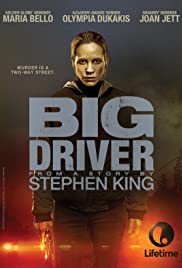
BIG DRIVER
US, 2014, 87 minutes, Colour
Maria Bello, Ann Dowd, Will Harris, Joan Jett, Olympia Dukakis.
Directed by Mikael Salamon.
Big Driver is a brief feature film for television, directed by veteran Mikael Salamon, based on a short story by Stephen King. It is basically a revenge drama.
Maria Bello plays a successful crime novelist invited to speak to an enthusiastic fan club. The president, played by Ann Dowd, is welcoming – but suggests an alternate route back home. Along that route, the novelist has a flat tire, is initially helped by a large man, the Big Driver, who then rapes her (strong sequences showing the brutality of the man and the sexual violence). He leaves the novelist for dead. However, she revives, makes her way to the store, is able to get back home. She decides for revenge, realising, as does the audience, that she has been set up by the president of the fan club, to go on the route home, to be attacked. The novelist researches the family, goes to confront the mother, killing her, then tracking down the brutal son, shooting his brother by accident, finally a confrontation.
While these aspects are straightforward in the revenge genre, there are various Stephen King aspects: the novelist and some trauma in her past, her success in her writing, and not being involved in any personal relationship, some hallucination sequences where she can converses with the voice on the GPS, with one of her characters, played by Olympia Dukakis, who continually appears to her giving opinions and judgement, and her imagining the men she has killed actually answering her back.
There is a cameo performance from singer Joan Jett, rather unexpected in this context.
1. Stephen King story? Thriller? Psychology? Hallucinations? Crime writer?
2. The world of the crime writer, home, friends? Driving to the readers’ function? The back roads? Ruined buildings? The local town? Atmosphere? The musical score?
3. Tess Thorne’s story, age, experience, career, success, phone communication with her neighbour, no personal relationship? Driving to the talk, the welcome from the women, the questions? The president, the cheque? The GPS, the advice for the shortcut, the scenic drive, the flat tire, the encounter with the big driver?
4. The big driver, friendly, fixing the tire, turning on Tess, the brutality of the rapes? His leaving her in the drain, the other bodies? Awakening, walking, her fear of the bikie groups, coming to the town, the store, phone call, the driver, taking her home? Her Washington cleansing?
5. The hallucination touches, the conversation with the GPS, personalised? Doreen and her appearances, advice? Later the dead bodies speaking? Tess and her psychological state?
6. The call from the store, the friendly woman, discussions, getting back her car? And the question of who fixed it and brought it to the store?
7. Her research, finding the mother’s address, realising the setup? The family history, the suicide of the husband? Her going to the house, confronting the woman, the argument, the gun, getting the knife, killing her?
8. Her desire for revenge, supported by Doreen? Getting the gun? Hiding from her neighbour? Driving, at the address?
9. Seeing the truck, following it, hiding, shooting, the dead man’s brother?
10. Her reaction, Doreen’s advice? Completing her task, confronting the big driver, problems with the gun, the struggle, shooting him, the board with the nail, shooting him in the groin?
11. Doreen and her approval? At the computer, the new text, Doreen reading it, the knitting group approving? Psychological motivation for her books?
12. The imaginative world of Stephen King?
White Mile
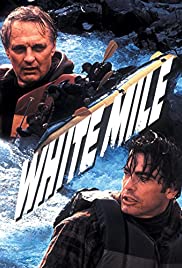
WHITE MILE
US, 1994, 96 minutes, Colour.
Alan Alda, Peter Gallagher, Robert Loggia, Bruce Altman, Fionnulla Flanagan, Jack Gilpin, Ken Jenkins, Dakin Matthews, Don Mc Manus, Robert Picardo.
Directed by Robert Butler.
White Mile is quite a striking drama. The name indicates a river in Canada and a particularly difficult area of white water rafting. The sequences on the water, the overturning of the raft, the men in the water, struggling, dying, rescued, are powerfully presented and edited.
However, the whitewater sequences, while realistic, are also symbolic. The main action of the film focuses on an advertising agency, corporate America, the emphasis on money making the emphasis on morale in the company and morale building.
Alan Alda plays Dan Cutler, the executive in an advertising agency, strong-minded, not prone to self-doubt, successfully running the company, dominating his staff pressurising clients. Peter Gallagher plays Jack, his immediate support, deferential to his boss.
Dan Cutler enjoys white water rapids and has decided to invite all his subordinates, executives and contacts to join him in Canada for morale boosting exercise. While they make the choice to go, a number of them are hesitant, inexperienced. Also in the group is a former executive of the company, now retired, an enthusiastic fishermen, offering sound advice, played by Robert Loggia. Fionulla Flanagan plays his sympathetic wife.
There is an accident, five of the men die. The retired executive’s wife then sues the company and the latter part of the film takes place in the courts. Dan Cutler is confident, and puts pressure on his assistant, especially in terms of company loyalty. However, the younger man has to face the dilemma of loyalty or his personal integrity.
An interesting opportunity to reflect on personal morality as well as corporate morality.
1. The title? The focus on the rapids, the endurance? The focus on the purpose of the journey, for business, for morale building?
2. The world of advertising, offices, film sets? The trip to Canada? The scenery, the camp, the bar? The river, the rapids, dangers, rescue? The courtroom? The musical score?
3. The world of advertising, the young executives, the discussions about the promotion, ideas, basketball, the nuns playing, the sneakers? Their working with Dan Cutler? His advice, approval? The discussions with Andy? His caution? Agents and clients? The phone calls to Nick, his advice? This example illustrating the world of advertising and the pressures? Money involved?
4. Dan Cutler, his personality, businessman, self-confidence, his relationship with those under him, with clients? Strong, dominating? The past and the trips on whitewater? His plan, gathering the variety of men together, making demands? The flight, the night before, the fellowship? His single-minded attitude towards the journey, building up the men, working together, morale? His domination of Miller, not wanting tourists? The argument, everyone on the one boat?
5. Jack, the young executive, admiration for Dan Cutler, Cutler dominating him? His friendship with Nick, going fishing with him, the discussion about pressures on the clients? Nick, the veteran, his past, the fishermen, love of fishing, his relationship with his wife, the jokes, his willingness or unwillingness to go on the whitewater?
6. The introduction to the rest of the group, the men working with Dan Cutler, Cutler and his interviewing David's wife? The men from a variety of companies, age, backgrounds? Working together?
7. Everyone in the boat, the exhilaration of the rapids, hitting the rock, everyone in the water? Men swimming, floating, drowning? Jack, getting back on the boat, rescuing Andy? Miller, going back, the next raft, organising helicopters? Dan on the rock, holding his hand out to Nick, not able to hold him? The different rescues, the helicopters of the bodies?
8. The impact on the survivors, Jack and his reflections? Dan and his injury, self-confidence?
9. Time passing, back to work, Dan in his office, his injury, David's wife coming to visit, the payout, her disdain? The issue of Gena suing, the damages? Dan and his attitude, detached, partly amused? His talk to Jack, to persuade Gena not to continue?
10. Jack, the visit to Gena, her experience of the company, condolence and yet the pause, wanting and not to sue? Jack and his talking with her, her urging him to the truth?
11. Jack, Andy talking with him and prodding his conscience, the further talks with Dan, Dan and the issue of loyalty, pressurising Jack? The issue of the legal documents and their being flawed?
12. In the court, the expert on rafting and his advice, regulations and disregard? The pressure on Miller and his putting the group in the one vessel? The issue of the men themselves and whether they were being pressurised for their own responsibility in going? Dan Cutler and his testimony?
13. Jack, his speaking the truth as he saw it, the issue of the colouring of the truth? Gena and her response to Jack? Her winning the case but the other men required to pay because of their choice on responsibilities?
14. A blend of action adventure in the vivid filming of the whitewater and the accident? With the portrait of the corporate world? The world of business? Moneymaking, money-losing, truth and loyalty?
Way Back, The/ 2020
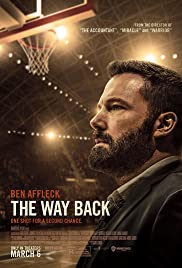
THE WAY BACK
US, 2020, 108 minutes, Colour.
Ben Affleck, Al Madrigal, Janina Gavankar, Michaela Watkins.
Directed by Gavin O' Connor.
There are several nuances in the title of this portrait of a man and his failings. There is the way back to his self-esteem. There is a way back to his rehabilitation from alcoholism. There is a way back to his better self, to some kind of redemption.
On the one hand, this is a basketball film, with many of the familiar conventions of the sports story. On the other hand, this is a very personal story about a man and his failings, comeback and continued failings, about the need for some kind of redemption.
For those who enjoy basketball, there are scenes of practice, a losing team becoming better, the creation of a spirit in the team, the exhilaration of competitive matches, the ups and downs of the particular members of the team and the demands of the coach, the final match full of energy and tribute to the coach.
But, overall, the film is the portrait of the coach. He is played by Ben Affleck, a mature performance showing a man whose self-esteem has lowered over the years, especially in the face of a tragedy. He works on a building site, lives alone estranged from his wife, does visit his mother and his sister and her family, admired by his nephew, but has few prospects in bettering his life and himself.
A step towards the way back and was redemption comes from the parish priest, Fr. Devine, who invites him to come back to his school where he was a basketball champion in order to coach the team. He is quite reluctant, spends time brooding, but actually does go back to accept the job. Interestingly, this is a Catholic high school and the basketball competition seems to be an inter--Catholic schools’ competition. (And, there are standards at the school, zero tolerance towards alcohol in the school and a language norm, which Jack, with his four letter outbursts, needs to tone down – and the assistant priest, Fr. Whelan, who attends practices and the matches, keeps insisting.)
Gradually, the reasons for Jack’s collapse emerge, the untimely death of his son, his inability to communicate his grief and his feelings, his lack of support for his wife and their separation.
The film does not offer Jack any easy way back. He has to go through quite a moral and physical collapse, losing his job, a drunken accident, hospitalisation. And then, we see the first steps towards rehabilitation. But, we know that Jack has failed previously and can only hope that this time he will be more successful in his redemption.
1. The title? Jack’s way back in basketball and coaching, his way back from alcoholism, his way back from grief and self-isolation?
2. The American city, streets, bars, homes, the school, offices, stadiums? Sports and matches? The musical score?
3. Ben Affleck as Jack? Age, experience? The background of basketball at school and his reputation? Filling in the background of his marriage, his wife and love for her, his son, the illness and death? His grief, isolation, not talking with others, failing his wife in the situation? His drinking? His work on building sites? No hope?
4. Fr Devine and his approach, the offer of the job? Memories of his past? His initial reaction, refusal, spending time pondering, at home, in the shower, reluctant? He is going to the school, with Fr Devine, getting the job? Working with Dan?
5. Going to visit his family, his bond with his mother, his sister, admiration from his nephew? The later visits to the family? His sister’s anger with him, her continued support, visit him in hospital?
6. The basketball story, familiar material, the various sequences with Jack coaching, his blunt methods, continued swearing (and the regulations at the school and Fr. Whelan’s complaints)? The members of the team, their personalities, Jack and punctuality and the boy expelled from the team? His going back to Jack’s house, pleading, Jack’s harsh stands, the boy and his love for the game, coming back? The friendship with Marcus, his becoming captain? The boys working together, the practice, the matches, from losses to gains? Building a spirit?
7. The Catholic atmosphere of the story, the Catholic schools and their competitions, the zero tolerance of alcohol, strict discipline? Prayers and spirit?
8. Jack, the meetings with his wife, harsh comments on her behaviour, the visit to his son’s grave?
9. The news for Jack to go to hospital, his seeing the children with cancer, not able to face it, memories of his son?
10. His continuing to drink? Failure to turn up at practice? Fr Devine and Dan coming to see him, the confrontation, banning him? The repercussions?
11. The outing with the young woman, crashing the car, going into the wrong house, being evicted, his fall, injuries, hospital?
12. Jack confronting himself, his sister’s influence, some counselling, opening up, acknowledging his grief, favours?
13. The return to his family, going to see the basketball match, the team wanting to win for his sake?
14. The way back, rehabilitation, some form of redemption?
Calender, The
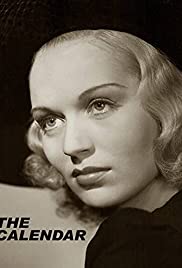
THE CALENDAR
UK, 1948, 79 minutes, Black and white.
Greta Gynt, John Mc Callum, Raymond Lovell, Sonia Holm, Leslie Dwyer, Charles Victor, Felix Aylmer, Sydney King, Barry Jones, Diana Dors.
Directed by Arthur Crabtree.
The calendar is based on a thriller by Edgar Wallace. However, it is not a murder mystery. Rather it is a racing story.
The main focus is on a war veteran, Gary, played by Australian John Mc Callum during his years in Britain in the late 40s (later returning to Australia and becoming a force in Australian cinema over many decades). He is engaged to a glamorous blonde, Wenda, played by Greta Gynt. When he is disinherited by his aunt, she breaks the engagement and marries a rather silly-ass English Lord (Raymond Lovell).
Gary owns horses. Some are well-trained by the Lord’s sister, Molly (Sonia Holm). Given Gary’s financial troubles, he makes a plan while drinking for his horse not to win in the next day’s race. He sends a telegram to Wenda advising her not to back the horse. This telegram leads to many complications, being picked up by the Lord’s close friend, used against Gary, Gary sobering and changing his plan. The further complication is that the telegram is handed in to the stewards, interrogation of all concerned, the threat of withdrawing the horse from a significant race.
The main tension in the action comes towards the end where Wenda has denied all knowledge of the telegram and messages, the others all band together to force her to tell the truth and then forge her signature on an admission – and, of course, the horse winning the race.
Leslie Dwyer plays a former burglar in the service of Gary, a genial presence, stealing all his scenes – and organising the robbing of Wenda’s safe as well as the forging of her signature. He has the final smile at the camera when he recovers the pearls that Gary had lent Wenda and she had refused to return to him.
For those who enjoy the British cinema of the past.
1. A racing story? From thriller writer Edgar Wallace?
2. Britain in the postwar years, the racing industry, crowds at races, an inside story of management, betting? British society and wealth? The musical score?
3. Gary Anson, his war service, owning horses, racing them, betting, spendthrift, his aunt’s will, not leaving the mansion to him, the string of pearls to be sold to prevent him from bankruptcy? His pleasant manner, liked by all. His relationship with Wenda, engagement, the plans for marriage, her reaction to his poverty, breaking off the engagement, her marrying the rich Lord, Gary as best man at the wedding? Gary at home, Sam Hilcoat, his servant, jokes about firing him, his continued service? On the track, the collapse of the horse, having to be put down, the jockey with his injury? Gary working with Molly, her success in training?
4. The range of background characters, Molly, sister of the Lord who marries Wenda, her skill at training, attraction towards Gary? Hillcoat, burglaries in the past, a forger, mixing cocktails, enthusiasm, smart remarks, the full-service? John Dory, the bookmakers, friendship with Gary, placing the bet, with his own money, offering it back to Gary? Tony, friendship with Lord Hannaford, sponging on him, going to Paris, Gary’s telegram and keeping it, using it, living in, expelled by Wenda?
5. The situation with My Darling? Gary and money, drinking, the suggestion to pull the horse in the race, calling in the jockey, his agreement? Sending the telegram to Wenda at the airport advising her not to back My Darling? The next morning, sober, the talk with the jockey? The note on the hundred pound note to Wenda, giving her advice? Hillcoat delivering it?
6. Lord Hannaford, a silly ass’s Lord, his wealth, marrying Wenda, her extravagance, the bills? The visit to Paris? His suspicions about Gary? Tony egging him on?
7. Gary, his visit to Wenda and her bedroom, the latter, Tony alerting Lord Hannaford, the confrontation, Gary leaving? The issue of the hundred pound note, the message, Hillcoat’s pencil and indelible, Molly and the robbing of the safe?
8. My Darling coming second, the hopes for the main race? Ascot, the royal guests, the style of racing?
9. Lord Hannaford, Tony and the telegram, taking it to the stewards, the head of stewards, the hearing, the witnesses, the jockey and his covering, Molly and her story, Gary and telling the truth, the support of Sir John Garth? The decision of the stewards? To withdraw My Darling?
10. The tension before the race? Lord Hannaford late, the request to the chief steward, his not believing the note, that Gary had forged it? Tony becoming supportive, flirting with Wenda, telling of the story of his inheritance, her falling for it? The group coming, Lord Hannaford and the divorce, their forcing Wenda to sign the cheque, Hillcoat forging her name on a confession, taking it to the chief steward – the reinstatement of My Darling, the win?
11. Happy ending for all – but comeuppance for Wenda?
Falcon in Mexico, The
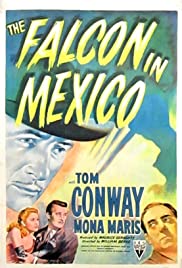
THE FALCON IN MEXICO
US, 1944, 70 minutes, Black-and-white.
Tom Conway, Mona Maris, Martha Vickers, Bryant Washburn, Nestor Paiva, Emory Parnell.
Directed by William Berke.
This is the ninth film in the Falcon series. Tom Conway, the brother of George Sanders, has now taken over from his brother in the role.
The film opens in New York City with issues about a painter, his death, the surfacing of all his paintings, the Falcon teaming with the artist daughter, travelling to Mexico, meeting a range of characters who had connections with the painter – with the question of whether he is still alive. One of the characters met is an owner of many of the paintings.
As expected, there are various complications, threats to the daughter, the painter turning up, masked, stating that he had staged his suicide to make his paintings more valuable. There are various deaths,, threats to the daughter’s stepmother, a mysterious taxi driver and his son. The taxi driver is revealed to be a Mexican undercover policeman.
The film reaches a climax with the Falcon disguising himself as the painter, drawing out the wealthy owner who turns out to be the murderer.
Informer, The
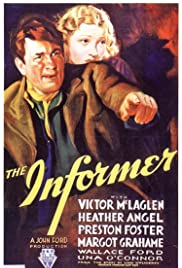
THE INFORMER
US, 1935, 91 minutes, Black-and-white.
Victor Mc Laglan, Heather Angel, Preston Foster, Margot Graham, Wallace Ford, Una O' Connor, Donald Meek.
Directed by John Ford.
The Informer has become something of a classic of the 1930s. Before this, John Ford had directed Western films and action films. For The informer, he won the Oscar for Best Director. In a sense, Ford never looked back, winning further Oscars for the long Voyage Home, How Green was My Valley and The Quiet Man. The film was also a high point for Victor Mc Laglan, winning an Oscar, and establishing himself as a character actor over many decades (including in John Ford films). Screenwriter Dudley Nichols won the Oscar for the screenplay as did composer Max Steiner for the score.
The film is set in the Irish Civil War (well explored on screen by Ken Loach in The Wind that Shakes the Barley). It is 1922. The setting is Dublin. Gypo Nolan has been ousted from the IRA, not following through on an execution that he was to perform, tempted by a bounty on an IRA man (Wallace Ford) and betraying him. Gypo is a man without control, splashes his money around, is friendly with the prostitute, Katy (Margot Graham) who wants £10 to emigrate to the United States. But Gypo is also a drinker and splashes the money around further, is brought before an IRA inquest, interned by them but escaping and then shot, finally going to a church where he encounters his mother, confesses to her and she forgives him.
The film is interesting as a drama of the 1930s – but very interesting in the light of subsequent 20th century history of conflict in Ireland, The Troubles.
1. The status of The Informer is a cinema classic of the 1930s? Oscar nominations and wins? Acting for Victor Mc Laglan, direction of John Ford, music by Max Steiner, screenplay by Dudley Nicholls?
2. The setting, civil war, the 1920s, the film made soon after these events? The film in the light of later decades of civil unrest in Ireland, The Troubles?
3. Dublin, the city, the streets, the scenes at night? The IRA headquarters? The church? The musical score?
4. The title, Gypo Nolan, Victor Mc Laglan’s screen presence, look, performance? His character, his age, the IRA, his being ousted, his being commission to kill, his not following through? The friendship with Katie, rescuing her from the attack? The issue of £10 for passage to America?
5. Frankie, the IRA, the bounty on his head? Gypo, the idea of the reward, to pay for himself and Katie to go to the US? Frankie and his death? But give her going to the authorities, the reluctant giving him the £20?
6. Gypo, his relationship with his mother, with his sister?
7. His telling Katie what he had done, going to the wake, the coins falling from his pocket? His drinking, his blaming Mulligan? His giving the money to the Blind man? Splashing his cash? His talking to everyone?
8. The authorities, not blaming Gypo at first, the inquest, his having the money, splashing it around,
9. Including accusing Mulligan? An eventual confession?
10. His being imprisoned by the IRA, his escape? Going to Katie, her going to Gallagher, his presiding over the inquest, his reactions?
11. The men, the hearing, the shooting – and Gypo going to the church, the encounter with his mother, confessing to her, her forgiving him?
Hubie Halloween
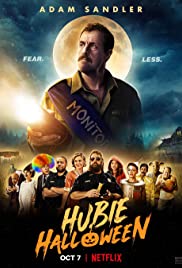
HUBIE HALLOWEEN
US, 2020, 102 minutes, Colour.
Adam Sandler, Kevin James, Julie Bowen, Ray Liotta, Steve Buscemi, Rob Schneider, Maya Rudolph, Tim Meadows, Michael Chiklis, June Squibb, George Wallace, Kenan Thomson, Shaquille O' Neal, Ben Stiller, Jackie Sandler, Noah Schnapp, Sadie Sandler, Sunny Sandler.
Directed by Steve Brill.
A comedy starring Adam Sandler. The comedy with cameos with quite a number of his close friends and associates over the years. Direction is by Steve Brill who directed five Sandler comedies. Sandler co-wrote the screenplay with Tim Herlihy who collaborated with Sanders in 12 screenplays over 25 years.
The setting is Halloween in the city of Salem, quite lavish and ostentatious Halloween celebration – where Hubie Dubois, Sandler’s character, is the monitor. He is one of those man-child characters, living with his mother, easily scared, but also venturesome and bold in his trying to help people. Actually, most of the people in Salem show an extraordinary mean-mindedness, bullying attitudes and behaviour, an ugly US.
Obviously, this is a film for those who enjoy Adam Sandler film is. Again, obviously, this is not a film for those who do not enjoy Adam Sandler films or who are rebelling against him.
Best to illustrate this by opinions for and against from the Internet movie database – audiences will know whether they should watch Hubie Halloween or not as they identify with the opinions.
A staunch Sandler supporter:
“In 2020 you would think people would know what to expect from Adam Sandler's (effective yet slightly hated) brand of raunchy and quick witted humor. But still there are so many smug types that somehow ridiculously expect some huge swings into left field for his Netflix original comedies. Obviously he's shown incredible versatility in his career but people should be able to gauge by the trailer and it being part of his Netflix contract that these aren't Punch Drunk Love, Reign Over Me, or Uncut Gems. Know what you're getting. The snobs that hate Sandler are the types that would go into an Applebee's and expect a five star meal.
This film sticks to classic Sandler formulas which isn't an issue imo. A humble basic story about an odd yet lovable main character that finds himself in the middle of a series of hilarious problems. Along the way he runs into other weird zany characters and maybe a few villains that join in on or his hilarious antics. The actors are the usual Sandler friends that he's had in other films.
Overall its just a nice comfort Halloween themed Sandler comedy that shouldn't be taken so seriously by snobby critics that can't grasp the point of these films after all these years. Throw it on and forget about the world.�
A staunch Sandler condemner:
“Another in a long list of disappointing recent movies. In a continuing attempt to find something worth watching in the last few years I was hopeful here.
I like Halloween, and typically I have liked Adam Sandler. I couldn't agree more with the other reviews that his stupid voice almost ruined the movie immediately. It is so obvious fake, and often hard to understand, ruining the whole movie before it starts. Tried to fight past that to see some really gross stuff that wasn't funny and clearly just looking for lazy laughs.
Usually in these movies there is a good turning point where things start to go better for the main character, until ultimately the movie finishes with a conclusion making you feel like the main character "won".
In this movie, everyone loses. The performers, the director, and certainly the audience. This isn't a spoiler, just a fact.� (Both comments from IMDb bloggers)
So, there you are!
Return of the Hero, The/ Le Retour du Heros
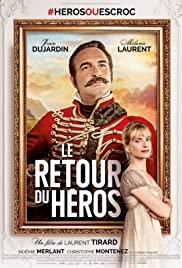
THE RETURN OF THE HERO/ LE RETOUR DU HEROS
France, 2018, 90 minutes, Colour.
Jean Dujardin, Melanie Laurent, Noemie Merlant, Christophe Montenez, Evelyne Buyle, Fyodor Atkine.
Directed by Laurent Tirard.
In many ways, an enjoyable romp. However, there are some serious undertones about war, death, desertion, as well as false heroism and fraud.
The setting is 1812, the mansion of a French family. Jean Dujardin is a showy captain, riding to propose to the daughter of the house before he goes off to war. He clashes with the older daughter, Elizabeth, Melanie Laurent. He promises to write to his fiancee but does not. She pines, Elizabeth writes letters in his name and the younger sister revives and writes back. Elizabeth contrives to indicate that he has died in action and the sister marries a local suitor.
The complications arise when the captain arrives back, impoverished, having deserted. An encounter with Elizabeth and her warning him off encourages him to spruce himself up and return, regaling the family, with rapt listening, to all his exploits that Elizabeth has created for him, but developing diamond mines and members of the family wanting to invest.
The interactions between the captain and Elizabeth include her setting him up with her sister’s husband and the fighting of a duel. However, the captain comes out on top every time.
There is a final testing time when the Cossacks are attacking the mansion, the captain has to make a choice, in fact, goes out heroically to confront the mounted Cossacks with one gun – but the French intervene and win the day. He makes peace with Elizabeth – and she shrewdly wants to share in the fraud investments in the diamond mine. When he is called up to follow the troops into action, he heroically rides off. They turn left. And he turns right and rides faster way!
1. The Napoleonic wars? 1812? Napoleon’s retreat? The Cossacks pursuit? Life in the French countryside?
2. The recreation of the period, costumes and decor, the mansion, the grounds, the lavish interiors? The battle sequences? The musical score?
3. The blend of tones, serious and comic? Ideals, Romance? Fraud and deception?
4. The irony of the title, Neuvillel as hero, the opening, his getting dressed, gallant riding, the encounter with Elizabeth, the proposal to Pauline, the delight of the family, his being called to war? The idealised Napoleonic soldier? His promise to write to Pauline every day?
5. No letters, Pauline languishing, Elizabeth’s idea, composing letters, Pauline replying, the creation of all kinds of adventures, heroism, going to India, elephants, plantations…? The letter to say that he was besieged, presumed dead, Nicholas and his attentions, Pauline marrying him?
6. The hero returning, in the coach, smell, hungry, the encounter with Elizabeth, her hostility, warning him off? Denouncing him? His dressing himself up, his return?
7. The welcome from the family, the sequences of him recounting his deeds, initially playing then developing the material from Elizabeth’s information, then his letting loose, the vividness of his stories, the introduction of the diamond mine? The delight of the listeners? The various proposals to finance the mine? The effect on Pauline, infatuation? Nicholas and his reaction?
8. Elizabeth, her fascination with the captain, yet her hostility? Wanting to bring him down? Threats of exposure, especially about the mind? His explanation of the financial scheme, pyramid?
9. Elizabeth forging the note, talking with Nicholas, his reading the note, challenging the captain, the duel, the captain and willing, the selection of pistols, his giant strides, Pauline hurrying to the site, standing on the way, twisting the situation into gallantry? Elizabeth watching and frustrated?
10. Elizabeth persuading him to confess – and his build-up, and then the proposal to marry Elizabeth? Her parents, critical of her, telling the captain they would not be upset if he backed out?
11. The arrival of the Cossacks, the French troops, the general, inviting him to the dinner, the conversation, Elizabeth wishing the captain to be exposed?
12. The general and his invitation for the caaptain to explain the battle in Austria – and the very serious speech, his telling the truth about the massacre, his saying that he ran fast?
13. The Cossacks and their approach, the family and their fears, the captain going out, one rifle, confronting the troops? Their riding towards him, the explosions, the French attack? The captain as hero?
14. The possibility of marriage with Elizabeth, her getting a percentage of the investments?
15. His being asked to leave with the troops and go to battle, his farewell, his riding away, and his turning in the opposite direction!
16. A tongue in cheek picture of heroism? But serious undertones about war?
Jay and Silent Bob Reboot
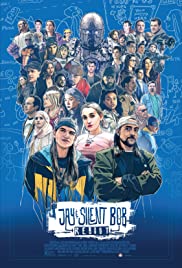
JAY AND SILENT BOB REBOOT
US, 2019, 105 minutes, Colour.
Kevin Smith, Jason Mewes, Harley Quinn Smith, Matt Damon, Jason Lee, Ben Affleck, Joey Lauren Adams, Fred Armesen, Diedrich Bader, Melissa Benoist, Jason Biggs, Aparna Brielle, Adam Brody, Tommy Chong, Keith Coogan, Rosario Dawson, Michelle Edmund, Shannon Elizabeth, Dan Fogler, Chris Hemsworth, Val Kilmer, Justin Long, Joe Manganello, Craig Robinson, Stephen Root, Jennifer Schwalbach Smith, Molly Shannon, Method Man, James Van Der Beek, Alice Wen.
Directed by Kevin Smith.
Clerks, Mallrats – IN!
Jay and Silent Bob Strike Back – INNER!
Jay and Silent Bob Reboot – INNEST!
Jay and Silent Bob have a history over 25 years, 1994-2019, a collaboration between Kevin Smith as writer, director, editor, starring as Silent Bob (and making some appearances, as here, as a rather loud Kevin Smith himself) and his slacker star, Jason Mewes.
If you don’t know anything about Jay and Silent Bob, there is no need to read any further – the screenplay and its shenanigans depend on how well you know them, like them, love them.
If you are a fan of Kevin Smith, know his range of films including Chasing Amy, Dogma, Jersey Girl and the more eccentric horror thrillers of more recent times, Yoga Hosiers, Tusk, then you are really IN. So, if you want to be up-to-date as Well Is have a recapitulation of Kevin Smith’s career, then you will respond to the invitation to watch the reboot. Actually, there is some discussion about the difference between a remake and a reboot – and whether there is something new and fresh about a remake or whether all the old gags get another chance at life, a reboot.
The present film is basically a reboot. Jay and Silent Bob are much the same as they always were, Jay loudmouthed, and foulmouthed, drugs, the kind of person you would want to meet only on screen and definitely not in real life! And, Silent Bob is much the same, miming, wide-eyed expressions, much more genial. And, somewhat lighter after Kevin Smith suffered a heart attack.
When they are busted for drugs, they are then banned from using their names, their lawyer having trapped them. They decide to go on a quest to Hollywood to stop any remakes and reboots. They stopover in Chicago and, this is where something new happens, Jay discovers that he has a daughter. In fact, much is made of this theme, Jay forbidden to tell Millennium Millie (played by Kevin Smith’s own daughter, Harley Quinn Smith) that he is her father. There are quite some shenanigans on the way to Hollywood, and they arrive to go to, not Comicon (where Smith always appears) but to Chronicom has made,.
The film gives an opportunity for Smith to reminisce about the various films that he is made (critical of Copout) and his favourite themes, especially of Star Wars and science-fiction. And there is opportunity for some of his friends and stars to explain themselves, Matt Damon about his angel Loki from Dogma, Ben Affleck to reminisce about Chasing Amy and Jersey Girl, an encounter with Jason Lee, with a panel of actors from Clerks.
And, finally much is made of the father and daughter theme. The final credits take us through most of the film again, a chance to see some of the many stars and friends with their cameos – and a final, amusing one, with the late Stan Lee.
A lot of discriminating fans have been very disappointed with this reboot, feeling that it went over old times too much, that many of the jokes were familiar, too familiar, that they wanted something new. Be that as it may, here are Jay and Silent Bob after 25 years.
It's a 2 feet 6 inches Above the Ground World/ Anyone for Sex?

IT'S A 2'6 ABOVE THE GROUND WORLD (ANYONE FOR SEX?)
UK, 1979, 93 Minutes, Colour.
Hywel Bennett, Nanette Newman, Russell Lewis, Angharad Rees, Milo O’Shea?, John Cleese.
Directed by Ralph Thomas.
Anyone for Sex? is a slight and amusing British comedy. The title indicates the tone. It was also called The Love Ban as well as It’s a 2’6� Above the Ground World. This was the era when more soft-core pornography was being seen more widely and the British, reticent on the surface, began making films like Confessions of a Window Cleaner or, more respectably, No Sex Please, We’re British. This film has the advantage of a superior cast which includes Hywell Bennett and Nanette Newman as a married couple – he having problems, being very religious, by having sexual fantasies. Irish actor Milo O’Shea? portrays the local priest. John Cleese has a guest role as a contraceptives lecturer.
The film was directed by Ralph Thomas, who made quite a number of films in Britain in the 1950s ranging from war films (Above Us the Waves) to the Doctor in the House series, to historical films (A Tale of Two Cities) and moving films like Conspiracy of Hearts. A slight film – which indicates a perception of sexual attitudes in Britain at the beginning of the 1970s.
1. The implications and tone of the title? The English title was "It's a 2'6" Above the Ground World"
2. How seriously was the film meant to be taken? Was it merely an example of British humour? Why?
3. Was the film realistic? To that extent was it meant to be taken seriously? Why?
4. The marriage situation and the need for some kind of birth control? Was the film made in good taste? Does this situation have the potential for exploration? For humour? How successfully did the film treat this situation?
5. Mike as a man, husband, Catholic? The humour in his working in the underwear factory? Was he presented as a rounded personality, or a caricature? Kate as a woman, as a wife? Her exasperation, her not sharing her husband's religious beliefs? But her trusting them? The sequences at home with the squabbling and the fights? Were these convincing? Did they emphasise the importance of the theme?
6. The character of Father Andrew? Was he a convincing priest? Or was he a figure of humour? Why?
7. What did the film have to say about Catholicism and conscience in moral matters and in marriage questions? Was this well presented clearly and convincingly? Or glossed over?
8. Were the sexual pressures on the marriage made clear, convincing? The fantasy sequences? Their humour and their reality? (The humour of Father Andrew's fantasies).
9. Did the film discuss adequately the realities of birth control? Pills? Lectures on birth control?
10. Did the sub-plot of the au pair girl and the young man add anything to the film? Did it add to the farcical nature of some of the sequences? How well?
11. How would the marriage be saved? What alternatives were there?
12. The film's style of farce?